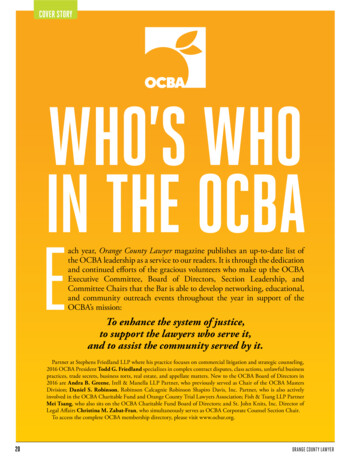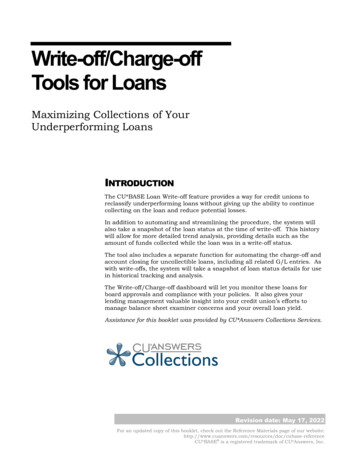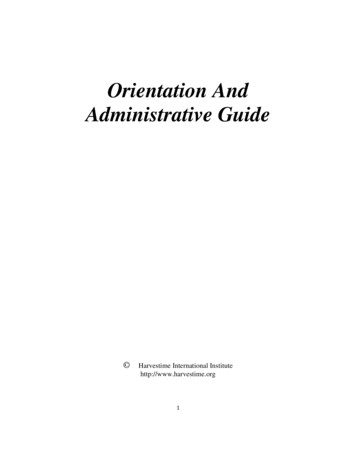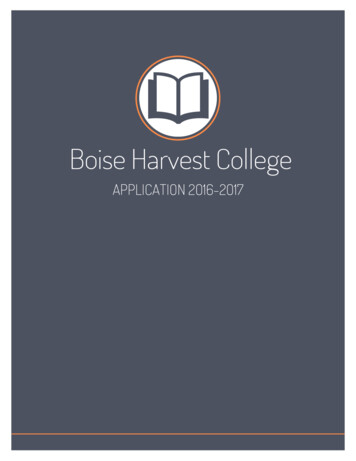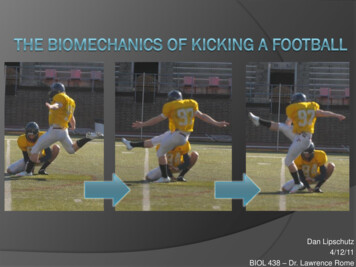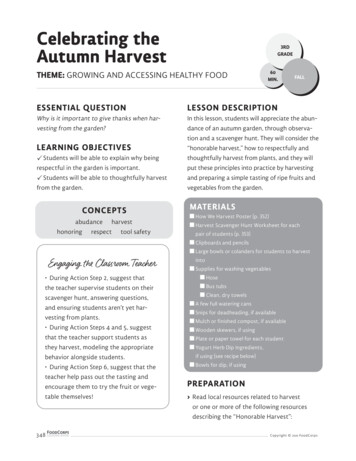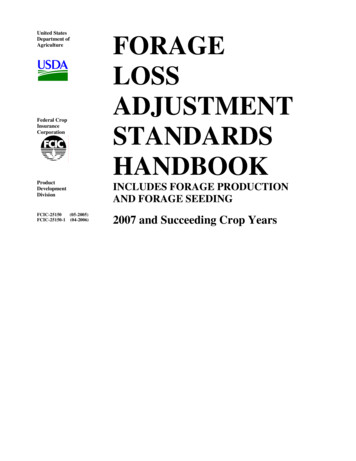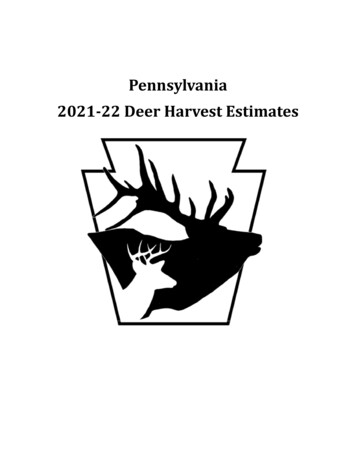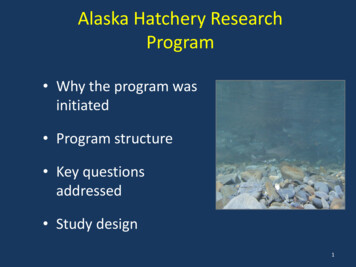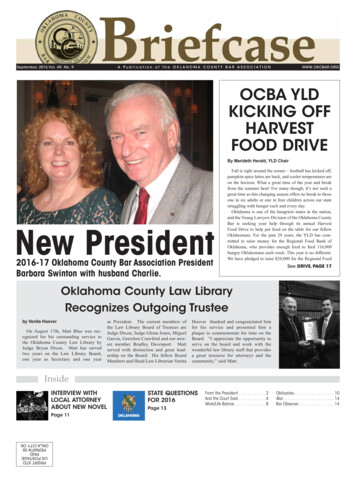
Transcription
September, 2016 Vol. 49, No. 9A Publication of the OKLAHOMA COUNTY BAR ASSOCIATIONWWW.OKCBAR.ORGOCBA YLDKICKING OFFHARVESTFOOD DRIVEBy Merideth Herald, YLD Chair2016-17 Oklahoma County Bar Association PresidentBarbara Swinton with husband Charlie.Fall is right around the corner – football has kicked off,pumpkin spice lattes are back, and cooler temperatures areon the horizon. What a great time of the year and breakfrom the summer heat! For many though, it’s not such agreat time as this changing season offers no break to thoseone in six adults or one in four children across our statestruggling with hunger each and every day.Oklahoma is one of the hungriest states in the nation,and the Young Lawyers Division of the Oklahoma CountyBar is seeking your help through its annual HarvestFood Drive to help put food on the table for our fellowOklahomans. For the past 29 years, the YLD has committed to raise money for the Regional Food Bank ofOklahoma, who provides enough food to feed 116,000hungry Oklahomans each week. This year is no different.We have pledged to raise 20,000 for the Regional FoodSee DRIVE, PAGE 17Oklahoma County Law LibraryRecognizes Outgoing Trusteeby Venita HooverOn August 17th, Matt Blue was recognized for his outstanding service tothe Oklahoma County Law Library byJudge Bryan Dixon. Matt has servedtwo years on the Law Library Board,one year as Secretary and one yearas President. The current members ofthe Law Library Board of Trustees areJudge Dixon, Judge Glenn Jones, MiguelGarcia, Gretchen Crawford and our newest member Bradley Davenport. Mattserved with distinction and great leadership on the Board. His fellow BoardMembers and Head Law Librarian VenitaHoover thanked and congratulated himfor his service and presented him aplaque to commemorate his time on theBoard. “I appreciate the opportunity toserve on the board and work with thewonderful law library staff that providesa great resource for attorneys and thecommunity,” said Matt.InsideINTERVIEW WITHLOCAL ATTORNEYABOUT NEW NOVELPage 11STATE QUESTIONSFOR 2016Page 13From the President. . . . . . . . . . . . . 2And the Court Said. . . . . . . . . . . . . 4Work/Life Balnce. . . . . . . . . . . . . . . 8Obituaries. . . . . . . . . . . . . . . . . . . 10iBar. . . . . . . . . . . . . . . . . . . . . . . . 14Bar Observer. . . . . . . . . . . . . . . . . 14PRSRT STDUS POSTAGEPAIDPERMIT# 59OKLA CITY OK
2 BRIEFCASE September 2016BRIEFCASEFrom the PresidentSeptember 2016Briefcase is a monthly publication of theOklahoma County Bar Association119 North Robinson Ave.Oklahoma City, OK 73102(405) 236-8421Briefcase CommitteeJudge Jim Croy, Chris Deason, Ryan Dean, BenGrubb, Justin Hiersche, Scott Jones, Matt Kane,Travis Pickens, Liz Oglesby,Miles Pringle, AustinReams, Cari Remillard, Teresa Rendon, RexTravis, Collin Walke, Judge Geary Walke, JudgeAllen Welch and Alisa WhiteCo-editorsJoi McClendon& Shanda McKenneyContributing EditorsMichael BrewerRichard GoralewiczBill GordenWarren JonesKieran D. MayeOklahoma County Bar AssociationOFFICERS:Judge Barbara SwintonDavid A. CheekSheila StinsonAngela Ailles BahmRobert D. NelonCoree StevensonSTAFF:Executive DirectorDebbie GordenLegal Placement DirectorPam BennettMembership ServicesConnie ResarPresidentPresident-ElectVice PresidentPast PresidentTreasurerBar CounselJournal Record Publishing Co. Inc.PublisherCreative ServicesJoni BrooksJames NeedhamFor advertising information,call 278-2820.Postmaster: Send address changes to OCBABriefcase, 119 North Robinson Ave., OklahomaCity, Oklahoma 73102.Journal Record Publishing produces the Briefcasefor the Oklahoma County Bar Association, which issolely responsible for its content. 2014 Oklahoma County Bar AssociationOKLAHOMA COUNTY BARASSOCIATIONMISSION STATEMENTVolunteer lawyers and judges dedicatedto serving the judicial system, their profession, and their community in order to fosterthe highest ideals of the legal profession, tobetter the quality of life in Oklahoma County,and to promote justice for all.Thanks to all lawyers who serve By Barbara SwintonWelcome to ournext great year at theOklahoma County BarAssociation. I will beserving as the Presidentafter much preparationand coaching by our outgoing President, AngelaAilles Bahm and theOCBA staff members – you ladies rock!For those who don’t know me, letme introduce myself. I am a nativeOklahoman, born in Oklahoma City andhave lived in Okmulgee, Tulsa, Stillwaterand Norman.I graduated from Nathan Hale HighSchool in Tulsa and attended OSU forundergrad with a degree in PoliticalScience. Go Pokes! Off to Norman I wentfor law school which was interrupted bymoving to Manhattan, Kansas, KansasCity and then Atlanta. I finally stayed inone place long enough to graduate fromGeorgia State University School of Law in1991 and returned to Oklahoma to workfor Watson and McKenzie. I later movedto Riggs, Abney, Neal, Turpin, Orbisonand Lewis and then with David Lee andAssociates. A young lawyer could not askfor a better group of mentors.In 1996I was asked to apply for SpecialJudge by then District Judge RomaMcElwee and the rest is history! I served6 years on the domestic docket as aSpecial Judge then in 2002 ran for the seatvacated by Judge Blevins. I was elected inspite of the famous commercials, financedby an unhappy litigant, depicting me asa Barbie doll dressed in a judicial robe.Three election cycles later I am still here.In 2004 Nancy Coats retired and her civildocket became available. Getting to knowa new group of lawyers and area of lawwas daunting but oh so interesting. Everyday is a new day on this docket and boredom has never been a problem!I am blessed with a wonderful family– my husband, Charlie is a banker/lobbyist with Bancfirst. We recently becomeempty nesters when our youngest, Jenny,went north to Oklahoma State Universityto study biology. Our oldest, Caitlin andher husband Kevin, are expecting out firstgrandchild soon in Kansas City. Our nextoldest, Taylor, is here in Oklahoma Cityand currently works at the Court Clerk’soffice. Our pets are limited to ”Archie”,our 72 pound gentle giant of standard poodle mixed heritage.OCU law school has afforded me theopportunity to teach Pretrial Litigationfor eight years and last semester I took onthe challenge of Trial Practice. I love theCounty Bar, the OBA, our church leadership team, and the National ExchangeClub. One of our friends gave me atea towel that says “Stop UnnecessaryVolunteering”, but I honestly feel thatthere is NO unnecessary volunteering.I encourage all Oklahoma County Barmembers to join me in serving others.I know there are many lawyers alreadydoing great work with nonprofits and Iwant to explore ways to show our community that lawyers are giving back to ourcommunity every day.By way of example, but by no means asa limit to our involvement, next month Iwill share with you the next chapter in theOCBA’s relationship with Oklahoma CityPublic Schools Foundation. We are nowan official partner with the Foundation andI encourage all Oklahoma County Barmembers to join me in serving others.interaction with law students and helpingthem learn about professionalism from thebeginning of their career.This year I finished my term asPresident of the Oklahoma JudicialConference Executive Board, whichplans the statewide judicial educationalconference each July. I am still active onthe OBA Bench and Bar committee and Iencourage those with interest to join us.We have a great group of lawyers andjudges working on improving the justice system for all Oklahomans. We areworking on videos to help pro se litigantsunderstand the procedures when theyappear on high volume dockets and hopeto add more videos in the future.So, you may be asking, what’s with thetitle “Thanks to all Lawyers who serve.”?Well, my passion is service. I enjoyservice to the Oklahoma Judiciary, thewe will provide you, through the OCBAwebsite, many opportunities to serve inareas that hold your interest in public education.We also would like to know on whatboards you serve and when you may belooking for new members to help you andyour service organizations. We would liketo hear from you about your service in thecommunity and will be adding a sectionin the Briefcase to showcase communityinvolvement. We might even start a friendly competition between committees to seewho is giving the most time and talent –but I am guessing the YLD committee isway ahead of us all!Thank you for giving me this opportunity to serve the Oklahoma County BarAssociation. I look forward to a year ofservice, education, and camaraderie whilewe further our profession.
www.okcbar.org September 2016 BRIEFCASE 3BRIEFCASE YEAR IN REVIEWBy Michael W. BrewerApproximately one year ago I finallymade good on my promise to JudgeGeary Walke that I had made three yearsearlier to write a series of columns forthe OCBA Briefcase. This started outas a trilogy of articles for the OCBABriefcase introducing more mature practitioners to new technology, social mediaand the inherent issues for attorneys thatcome with “progress”. In the past twelvemonths I have learned that it is (1) difficult to teach an old dog new tricks, (2)no good deed goes unpunished and (3)it is very difficult to write a monthlyarticle much less a biweekly blog. Oneof my favorite writers, Dave Barry, aPulitzer Prize winner1 pens a year-endreview each year that is a worthy pieceof writing2. So with lofty goals I setmyself up to be a witty literate attorneywriting for the good of the profession.In September 2015, I set out to writea monthly installment for the Briefcaseand also publish it as an internet blogentitled “Open & Obvious?” The onlyfailure guaranteed more so than thisproject is rating my beloved Sooners inthe top 3 preseason with an incrediblydifficult early schedule and my truebelief that they will go undefeated.However, I did not immediately get100 likes or followers on social mediafrom this nor did the Sooners get to 1-0.Nor did I get a new client. So manyattorneys immediately ask themselveswithout a new paying client and noego gratification, why do it. I guess allattorneys are inherently modern dayDon Quixotes, regardless of age. Forwithout holding tightly to the causeof civil justice, how could we remainin this profession. I, for one, did learnfrom this exercise and will persevere onbehalf of the good of the County Bar andOklahoma Lawyers.It is only fitting that Judge Walke,who got me into this mess, would retireas editor on the one year anniversary ofmy first Briefcase article. I feel a littlebit like Charlie Brown trying to kickthe football that Judge Walke just pulledaway. But some other things have beenlearned along the way. My first installment entitled “Natives v. Immigrants”was written when people nationally weretalking about building walls. Some people are still talking about building wallsand even visited the other side of saidproposed wall. I was simply explainingwhy technology was a natural for millennials and not so much for boomers.My second article generally dealt withwhether old lawyers were too far alongto understand new social media. Noreal changes on that front to report butI did get a few readers of my blog onLinkedIn and Facebook. Skipping along,the theme of a later article was “When isa Friend Not a Friend”. Since that time“friends” have cyber penetrated just1 en.wikipedia.org/wiki/Dave Barry2 Miami Herald, Dave Barry’s 2015 Year In Review,December 23, 2015.about every computer system availableto penetrate including national retailers,banks, the IRS, Dropbox, LinkedIn andthe Democratic National Committee.My article begging for friends, “Can IBe Your Friend” got me nowhere. Thenext installment “Did My New FriendJust Take My Data?” is a question thatthe DNC is still asking.notifications online of certain “BestLawyers ” and “Super Lawyers ” atfirms and for lawyers that I know. Oncue with this article, I received an emailto be named a “Best Premises Lawyerin Oklahoma” from a European publication to be paid in euros, I forwardedit to Judge Walke to prove I do not writefiction. One of my lawyer friends, who isthe publishers are being proactive on theethics front regardless of the state. It isgood for the profession and makes sensesince these honors reach all 50 states andthe globe via the internet.So I hope that you got something outof this yearlong writing exercise and ifnothing else, at least a little knowledgeof what technology is out there andavailable. I also just received an invitation from one of the major publishers oflawyer marketing materials announcingan interactive webinar on blogging forall of those law firms wanting to increasetheir business. Their premise is that legalsurveys show that law firms who regularly blog more effectively communicatewith their potential markets and clients.Maybe, just maybe, I am ahead of thecurve. I’ll continue to contribute to theBriefcase and publish in “Open andObvious?” and hopefully with practiceI’ll do better. Unlike Judge Walke, I amnot ready to retire my quill and ink. Andas in a popular cable television series, noone is really dead unless you see theirhead on a pole.Michael W. Brewer is an attorney,founder, and partner of Hiltgen & Brewer,PC in Oklahoma City, Oklahoma. Tocontact Mike, email mbrewer@hbokc.law, call (405) 605-9000 or tweet himat @attymikeb. For more information,please visit www.hbokc.law.With some trepidation, I ventured intobar exam pass rate territory in anotherarticle. This article even drew a rebuttalarticle published by Judge Geary Walke,himself. So I guess I really missed themark on that one. But, bar exam resultsare around again and so are the same discussions as before. In a follow up installment, I listed considerations for gettingyour own piece of the cloud before theyrun out of clouds. I wrote this article sowell that I am actually buying a piece ofa cloud complete with all the cyber security bells and whistles. Encrypted emailability is now a must have for many clients. Are any of you doing these things?Then came “Are They Really Super?”Well I just received a boat load oflicensed in New York, recently posted onFacebook that he had received multipleinvitations to be nominated to the Top100 Lawyers in the state of New Yorkin his practice area. He noted the costof such honor and that at the time ofhis last invitation there had been around700 acceptances. As of this writing, Ireceived an invitation to be one of the100 something in Oklahoma lawyers.Again wondering how they count to100 I saw that most lawyers in Hiltgen& Brewer received this same letter. Ido note that several of the national andlocal publications now have very similardisclosure language for honors to theNew Jersey opinion requirements I discussed about in that article. It seems thatJohnson & Bisconew w w. o k l a l e g a l . c o mOklahoma’s Top-RatedLawyers Since 1995Martindale-Hubbell Personal InjuryWorkers’ CompensationSocial Security Disability1-800-426-4563405-232-6490The Hightower Building105 N. Hudson, Suite 100Oklahoma City, OK 73102
4 BRIEFCASE September 2016And The Court SaidAn Olio of Court ThinkingBy Jim CroySeptember 19, 1916One Hundred Years Ago[Excerpted from: O’Hern v State, 1916OK CR 77, 159 P. 938.]In this case the plaintiff in error,defendant below, was convicted of adultery, and sentenced to pay a fine of 250.The facts in this case are very remarkable,and the record, instead of lending colorto a prosecution begun in good faith, andfor the purpose of vindicating the law, andexalting the dignity of the home and thesanctity of the marital relation, bears theearmarks of a shameless scheme to disgrace the home, to bastardize a defenselesschild, and to sacrifice all that is sacred andholy, to enhance the prospect of obtaininga few dollars.The record shows that the husband,the prosecuting witness in this case, beforefiling this action commenced a 10,000damage suit against the defendant foralienating his wife’s affections. And yetthis injured husband and this estrangedwife were still living and cohabitingtogether, and conjointly swear that one oftheir defenseless children is a bastard, theoffspring of an illicit intercourse betweenthe defendant and the prosecuting witness’wife. This poor child was begotten in May,1910. The husband slept with the wife,and had access to her, not only in May,1910, but at all other times. She was ayoung, buxom, 180-pound woman; he anable-bodied farm hand. Yet they swearthat because of a derangement of thestomach, he scrupulously “refrained” fromand “waived” intercourse from Februaryto July, 1910, and thus attempt to fasten the stigma of illegitimacy upon theirdefenseless offspring. The presumption inlaw is that where the husband had accessto his wife, the child is legitimate; andthis defenseless child is entitled to thebenefit of this presumption. Besides, thepresumption of nature is that no man thathas sufficient stomach to enable him to dothe work of a farm hand will sleep with astout buxom young wife for five monthsand during all that time “waive” sexualintercourse. And in the eyes of every manthis child will also have the benefit of thispresumption as to its legitimacy.Besides, the husband, the prosecuting witness in this case, seems to regardintercourse with his wife as a commodity,which created a debt in his favor, which hehad a right to collect, as a butcher wouldan ordinary meat bill. And before beginning any action, in an attempt to collectthis debt, he wrote a long letter to thedefendant, which is in part as follows:“Ivanhoe, Okla. Sept. 25-11.“Mr. M.R. O’Hern. Wereceived your letter a few daysago and will say in reply to yourthreats & your witnesses youhave no witness nor can you getany that is a made up lie & youknow it & so do i know it. Doyou think that your lies, bluffs &undermining work will pay thatdet that you justly owe if youdo your mistaken there is onlyone way to settle it & that is tocome up & see me & i think wecan settle it all right, but if youthink your bluffs will pay thedet all right, but i have set mydetermination on this matter &shall carry it to the end & willwatch for my chance to fight formy rights as long as i may live& i will see that you pay this det.* * *”And when he failed to collect the debt,which he assumed O’Hern owed him byreason of his alleged intercourse with hiswife, he filed his 10,000 damage suit, andlater filed this action.There are a number of errors assigned,but it will not be necessary to considerthem all. The first is lodged against thesufficiency of the information, and, wethink, is well taken. The charging part ofthe information is that Mike R. O’Hern —“did unlawfully and feloniously committhe crime of adultery with one JeanetteCulbertson, who was then and there thelawful wife of Casner N. Culbertson, bythen and there having carnal knowledge ofthe body of the said Jeanette Culbertson,contrary to the form of the statute insuch case made and provided, and againstthe peace and dignity of the state ofOklahoma.”Section 2431, Revised Laws1910, defines adultery as: “Theunlawful voluntary sexual intercourse of a married person, withone of the opposite sex. * * *”It is clear, that in this information oneof the essential ingredients which distinguishes the offense sought to be chargedfrom other sexual crimes is totally absent.There is nowhere in the information anysort of allegation that the intercourse wasvoluntary. That ingredient in the statutorydefinition of adultery is not accidental, butis one of the ingredients that essentiallydistinguishes this crime from that of rape.And it is as important that the pleader incharging adultery should make this distinction, and allege in some way that theintercourse was voluntary, as it is in pleading rape to allege that the intercourse wasaccomplished by force and violence. Themere naming the offense, adultery, or rape,does not charge the crime; but it is thefacts pleaded, the acts alleged to have beendone, that fixes the status of the crime,binds the state, and puts the defendant nonotice as to what he may expect to meetand defend against. Suppose the pleaderhad said: “Mike O’Hern did unlawfullyand feloniously commit the crime of rapewith one Jeanette Culbertson, who wasthen and there the lawful wife of CasnerN. Culbertson, by then and there havingcarnal knowledge of the body of the saidJeanette Culbertson.”Would it be contended for a momentthat that would be sufficient to charge theoffense of rape? Why not? Because theessential ingredient which distinguishesrape from other sexual crimes is absent.But if we should sanction the informationin this case under it, the state would be asmuch at liberty to prove the intercoursewas accomplished by force and violenceas it would to prove it was voluntary; forin it the state is bound by no statementwhich indicates in the least whether theintercourse was voluntary or accomplishedby force. And the law will not permit this.The allegation that the woman is married,and the wife of a certain man, does not,of itself, show the crime to be adultery,any more than rape, for that is one way ofpleading that the woman is not the wife ofthe accused, which is a necessary allegation in charging rape.And no presumption, or intendment,can supply the defect in this information;for if we should indulge in presumptions,then the presumption that a woman willresist illicit intercourse is much greaterthan the presumption that she will voluntarily submitSeptember 23, 1941Seventy-Five Years Ago[Excerpted from Hughes v. Bizzell, 1941OK 277, 117 P.2d 763.]This is an action by the plaintiff, RuthThompson Hughes against the defendants,Dr. Bizzell: President of the Universityof Oklahoma, and Dr. Patterson, Dean ofthe Medical School, to recover damagesfor conspiracy in causing her dismissal aslibrarian of the Medical School. The trialcourt sustained a demurrer to the petition,the plaintiff refused to plead further, andthereupon the court dismissed the cause.Plaintiff appeals.The petition alleged the officialpositions of the defendants; that plantiff served efficiently as such librarianfrom September 15, 1931, to August 1,1938, at an approximate salary of 1,500per annum; that on May 31, 1938, shereceived a letter of that date, signed byDr. Patterson, discharging her as suchlibrarian; that the letter was written, andher discharge was procured, as a resultof a conspiracy between the defendantsentered into and carried out to destroy herprofessionally and her reputation as anefficient librarian; that she demanded, andwas granted, a hearing before the Board ofRegents of the University, and that at thehearing the defendants appeared and, infurtherance of the conspiracy, charged thatshe had procured her position by statingthat she was a graduate of WashingtonUniversity, in library science, and that suchinformation was carried in the bulletinsissued and sent out by the University, andthat by such charges the defendants ledthe Board of Regents to believe that sheshould be discharged as such librarian; thatsuch charges were false and such information had not been carried in the bulletins;that in fact she was employed as suchlibrarian on the true representation that shehad an A.B. degree from the Universityof Oklahoma, and that the only librarytraining she had was about 45 credit hoursof library science in the St. Louis LibrarySchool; that the defendants knew suchcharges to be false; that in furtherance ofsuch conspiracy the defendants refused togive her letters of recommendation so asto enable her to secure a like position inanother institution; that she had sustaineddamages in the sum of 50,000 as a resultof the carrying out of such conspiracy.We are committed to the rule that forthe purpose of testing the sufficiency ofa petition, a demurrer thereto admits thetruth of all facts well pleaded, togetherwith all inferences which may be reasonably drawn therefrom, and the petitionmust be liberally construed in favor of theplaintiff. . . . Therefore, for the purpose ofpassing upon the legal questions presented,we must assume that the conspiracy wasentered into and carried out as alleged, thatthe statements set out in the petition weremade, that they are false, that defendantsknew they were false at the time they weremade, that they were made with an evilintent to injure the plaintiff, and that as aresult thereof plaintiff was discharged andsuffered actual damages as alleged.Both parties insist that the gist of theaction is damages sustained as a result ofthe alleged conspiracy, and not damagesfor defamation. We will so treat it, andconfine our discussion to the question ofliability for the alleged conspiracy.A conspiracy is a combination of twoor more persons to accomplish, by concerted action, some unlawful purpose, or toaccomplish a lawful purpose by unlawfulmeans. Mangum Electric Co. v. Border,101 Okla. 64, 222 P. 1002; 11 Am. Jur.543; 15 C.J.S. 996; 5 R.C.L. 1061; 12 C.J. 540. It follows from this definition thatthere can be no conspiracy “where the actscomplained of, and the means employedin doing the acts, are lawful.” Walker v.Mills, 182 Okla. 480, 78 P.2d 697.Plaintiff admits that the defendantshad the right to discharge her withoutassigning any reason for so doing, butcontends that they used unlawful meansto do a lawful act, and that the unlawfulmeans consisted of the false charges setout in the petition, and that by makingsuch false charges she was defamed by thedefendants. The question then is whetherthe occasion for making the charges constituted an absolute or only a qualifiedprivilege. If the privilege was absolute, theacts of the defendants are not unlawful.But if the privilege is a qualified one, thenthe petition states a cause of action bycharging that the statements made werefalse and prompted by malicious motives,and the question is for the trier of the facts.We are of the opinion that the decisionin Sanford v. Howard, 185 Okla. 660, 95P.2d 644, is decisive of the issue presented. The powers and duties of the Boardof Regents and President of the ColoredAgricultural and Normal University ofOklahoma, there under consideration,
www.okcbar.org September 2016 BRIEFCASE 5are analogous to those of the Board ofRegents and President of the Universityof Oklahoma. . . . The occasion of thealleged slander by Sanford, Presidentof the Colored Agricultural and NormalUniversity, in the cited case, was substantially the same as the occasion of thealleged unlawful slander involved in theinstant case. That case construes section726, O. S. 1931, 12 O.S.A. § 1443, andholds that the remarks of the presidentat the session of the Board of Regentsconcerning the fitness of the plaintiff, anemployee of the school, were absolutelyprivileged. While, as pointed out by theplaintiff, there are respectable authoritiesholding that the occasion afforded only aqualified privilege, the cited case commitsus to the rule of absolute privilege. . . .Here the alleged slanderous statements were made at a session of the Boardof Regents, held to pass upon the discharge, by defendants, of the plaintiff. Thereason for the rule of absolute privilege isstated in Newell, Slander and Libel (4thEd.) p. 380, § 341:“The great underlying principle upon which the doctrine ofprivileged communications restsis public policy. This is moreespecially the case with absoluteprivilege, where the interests andthe necessities of society requirethat the time and occasion of thepublication or utterance, eventhough it be both false and malicious, shall protect the defamerfrom all liability to prosecutionfor the sake of the public good.It rests upon the same necessitythat requires the individual tosurrender his personal rights, andto suffer loss for the benefit ofthe common welfare.”***The Board of Regents is the governingboard of the University. It has the finalword in the employment or discharge ofits faculty members and employees. It isto the interest of the public that the bestqualified persons serve the University.The board must largely depend upon thepresident, deans, and heads of departmentsfor correct information as to the fitnessand qualifications of those on the payroll and those seeking employment. If, ingiving such information to the board, suchofficers were not under the rule of absolute privilege, every disgruntled person,refused employment or discharged, couldfile suit for damages for defamation orconspiracy against such officers and statea cause of action requiring them to standtrial before a jury as to their motives or thetruthfulness of their statements, regardlessof the correctness of the allegations of thepetition or the merits of the cause. Such arule would tend to deprive the board of thebenefit of candor and full disclosure as tothe qualifications of the employee or applicant. The rule of absolute privilege in sucha case is for the protection of the publicand not for the protection of the officers.The statements being absolutely privileged, it is immaterial as to whetherthey were made with improper motives orwhether they were false.It follows that the means employed tosecure the discharge of plaintiff were notunlawful, and the petition does not state acause of action for conspiracy.September 15, 1966Fifty Years Ago[Excerpted from Evans v. Lambert, 1966OK CR 126, 418 P.2d 217.]LaVon Evans was charged by the CityPolice of Oklahoma City on February 8,1966, with the offense of Driving WhileUnder the Influence of Alcohol, allegedlyoccurring on the 5th day of February, 1966.Petitioner filed a Motion for Jury Trial andsubmitted a written brief in compliancewith the order of the Municipal Court andthereafter, on the 30th day of March, 1966,said Motion for Jury Trial was overruledand the court ordered the Petitioner to trialon April 25, 1966, which was thereaftercontinued to April 27, 1966, to be triedwithout a jury. On the 26th day of April,1966, LaVon Evans filed an application forthis Court to assume jurisdiction and issuean Order proh
the Oklahoma County Law Library by Judge Bryan Dixon. Matt has served two years on the Law Library Board, one year as Secretary and one year as President. The current members of . Travis, Collin Walke, Judge Geary Walke, Judge Allen Welch and Alisa White Co-editors Joi McClendon & Shanda McKenney Contributing Editors Michael Brewer
